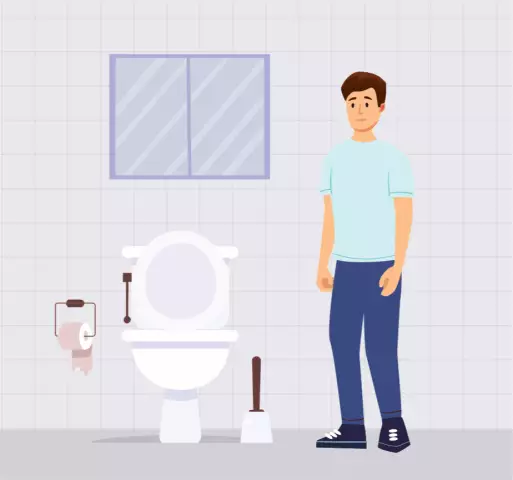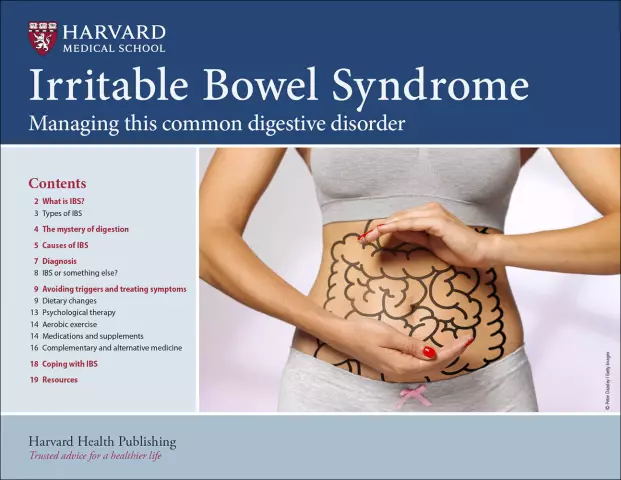- Author Rachel Wainwright [email protected].
- Public 2023-12-15 07:39.
- Last modified 2025-11-02 20:14.
Ileitis
The content of the article:
- Causes and risk factors
- Forms of the disease
- Ileitis symptoms
- Diagnostics
- Ileitis treatment
- Potential consequences and complications
- Forecast
- Prevention
Ileitis is an acute or chronic inflammatory disease of the distal small intestine, i.e., the ileum. The pathology is widespread, mainly young people (20-40 years old) suffer, men are slightly more than women. It is characteristic that the incidence of ileitis among rural residents is almost two times lower than among residents of large cities.
According to statistics, in 70% of cases, regular pain in the right iliac region is caused by chronic ileitis, most often of yersiniosis etiology.

Source: fb.ru
Ileitis is an urgent problem of gastroenterology associated with the difficulty of timely detection of the disease (nonspecific symptoms, impossibility of endoscopic examination).
Causes and risk factors
Inflammation of the ileum can be both acute and chronic. In children, ileitis is predominantly acute and is caused by pathogenic bacteria (E.coli, staphylococcus, streptococcus) or viruses (enteroviruses, rotaviruses). In adults, the course of ileitis is usually chronic, with periodic exacerbations. In this case, the causative agent of the inflammatory process is most often Yersinia. Much less often, chronic ileitis is caused by helminthic invasions.
The contributing factors are:
- unhealthy diet (frequent consumption of spicy, fatty extractive foods);
- fermentopathy;
- concomitant diseases of the gastrointestinal tract (gallstone disease, chronic pancreatitis, duodenitis);
- sedentary lifestyle;
- allergic diseases;
- smoking, abuse of alcoholic beverages;
- bowel surgery;
- intoxication with salts of heavy metals and other chemicals, poisons of animal and vegetable origin.
Inflammation of the ileum often develops against the background of ulcerative colitis, Crohn's disease (terminal ileitis), typhoid fever, yersiniosis, tuberculosis. In this case, ileitis is considered not as an independent nosological unit, but as a symptom of one of the listed pathologies.
Forms of the disease
Inflammation of the ileum can be limited (isolated ileitis) or be combined with inflammatory processes in other parts of the digestive tract.
Depending on the etiological factor, postoperative, enzymatic, toxic, alimentary, medicinal, infectious and parasitic intestinal ileitis are distinguished.
According to the severity of clinical symptoms, four forms of ileitis are distinguished:
- easy;
- medium-heavy;
- severe, without complications;
- severe, proceeding with complications.
In the course of chronic ileitis, incomplete, complete remission and exacerbation are distinguished.
Ileitis symptoms
Acute ileitis is characterized by a sudden onset and rapid onset of symptoms. The disease lasts for several days and in many cases goes away even without therapy. Its main symptoms are:
- flatulence, rumbling in the stomach;
- pain in the right iliac region;
- nausea, vomiting;
- diarrhea (stool frequency can be up to 20 times a day);
- an increase in body temperature up to 38-39 ° С;
- muscle and headaches;
- general weakness.
In chronic ileitis, the symptoms during an exacerbation are similar to those of an acute inflammatory process in the ileum, but they are much weaker. Patients usually complain of pulling pain around the navel or the right iliac region, loose stools with particles of undigested food immediately after eating. After defecation, the pain does not subside, and in some cases, on the contrary, it increases sharply, which can provoke the development of a collapse in the patient.
Diagnostics
If ileitis is suspected, the patient undergoes a laboratory examination, including:
- general blood test (leukocytosis with a shift of the leukocyte formula to the left, increased ESR);
- bacteriological and virological examination of feces - allows you to identify the causative agent of the disease, determine its sensitivity to antibacterial drugs;
- coprogram (decreased enzymatic activity, a large amount of carbohydrates and undigested muscle fibers);
- feces for occult blood;
- biochemical blood test (hypoproteinemia, a decrease in the concentration of certain trace elements).
If ileitis is suspected, an X-ray examination of the intestine with a contrast agent (barium sulfate) is shown. Evaluating the peculiarities of the passage through the intestine of the barium suspension, spasmodic areas of the ileum, the presence of strictures and fistulas in it are revealed.
Considering that ileitis in many cases is accompanied by other diseases of the gastrointestinal tract, it is shown that FEGDS, ultrasound and multispiral computed tomography of the abdominal organs are performed.
Ileitis is differentiated from other pathologies that also occur with diarrhea:
- Addison's disease;
- irritable bowel syndrome;
- nonspecific ulcerative colitis;
- thyrotoxicosis.
Ileitis treatment
Treatment of patients with acute ileitis is carried out in a hospital setting.
With repeated vomiting and severe diarrhea, in order to correct water-electrolyte disorders, infusion therapy with saline solutions and glucose solutions is performed.
With a confirmed bacterial etiology of the disease, antibiotics are prescribed. An indispensable component of the treatment of ileitis is dietary food. Food should be rich in vitamins and easily digestible, provide mechanical, chemical and thermal sparing of the organs of the gastrointestinal tract. If necessary, enzyme preparations are prescribed to improve digestion.

The scheme of complex drug treatment of ileitis includes intestinal sorbents, astringents, probiotics, vitamins.
In chronic ileitis, diet therapy is the main treatment. Diet food should be adhered to for a long time. Food should be taken frequently and in small portions. The diet should be balanced in terms of protein, fat, carbohydrates, trace elements and vitamins. The menu should not include fatty, fried and spicy foods.
Astringents of herbal origin, vitamins, enzymes and probiotics are prescribed in periodic courses. Outside of periods of exacerbation, patients with chronic ileitis are shown spa treatment.
Potential consequences and complications
If treatment is not started on time, acute ileitis can lead to the development of serious complications:
- hypovolemic shock;
- convulsions;
- DIC syndrome;
- acute renal failure.
Long-term chronic ileitis leads to a significant violation of the absorption of nutrients, which causes the development of osteoporosis, hypovitaminosis, deterioration of the skin and its appendages (hair, nails), weight loss.
Forecast
In acute ileitis, the prognosis is favorable. In the conditions of timely started therapy, the disease quickly ends with a complete recovery.
Chronic ileitis is characterized by a recurrent course. Diet food, the use of enzyme preparations allows you to achieve long-term remission, avoid the development of complications and significantly improve the quality of life of patients.
Prevention
Prevention of ileitis includes the following activities:
- early diagnosis and active therapy of chronic diseases of the digestive system;
- adherence to the principles of proper nutrition;
- maintaining an active lifestyle;
- quitting smoking and drinking alcohol;
- compliance with the rules of personal hygiene.
YouTube video related to the article:

Elena Minkina Doctor anesthesiologist-resuscitator About the author
Education: graduated from the Tashkent State Medical Institute, specializing in general medicine in 1991. Repeatedly passed refresher courses.
Work experience: anesthesiologist-resuscitator of the city maternity complex, resuscitator of the hemodialysis department.
The information is generalized and provided for informational purposes only. At the first sign of illness, see your doctor. Self-medication is hazardous to health!






